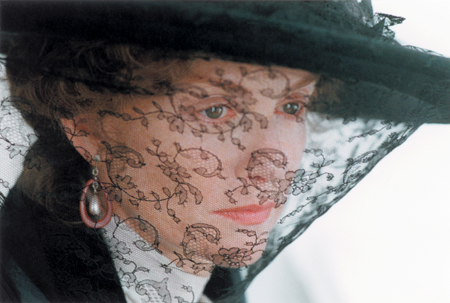|
Reviews of Recent Independent, Foreign, & Documentary Films in Theaters and DVD/Home Video
Directed & Written by: Patrice Chéreau. Produced by: Joseph Strub, Serge Catoire & Ferdinanda Frangipane. Written by: Patrice Chéreau & Anne-Louise Trividic, based on the novel The Return by Joseph Conrad. Director of Photography: Eric Gautier. Edited by: Fançois Gedigier. Music by: Fabio Vacchi. Released by: IFC. Language: French with English subtitles. Country of Origin: France/Germany/Italy. 90 min. Not Rated. With: Isabelle Huppert, Pascal Greggory & Claudia Coli. Though based on a 1897 short story by Joseph Conrad, one said to be heavily influenced by fin-de-siècle contemporary Henry James, this upfront and somewhat earthy cinematic adaptation lacks the mystery of its source by enlarging the role of the wife, Gabrielle, from the story (even making her the focus, the film is named for her after all), with the wife loosing her enigmatic quality, even though, like James, Conrad spells out every justification, every feeling for his warring and wrathful characters; it’s all there on the page, but in its place onscreen is a one-sided confrontation. In their cavernous maison, Monsieur and Madam Jean and Gabrielle Hervey preside over their weekly Thursday night belle epoque salon (perhaps to some, a gathering of the insufferably intellectual and artistic elites like that observantly ridiculed in Agnes Jaoui’s comedic film Look at Me, though set a hundred years later, but I digress), where Jean can take pride in his gracious wife, and, I have to say, rather long-windedly informs the viewer he loves, “as a collector loves his most prized collection,” but one has to remind oneself that her role is being played by the formidable actress Isabelle Huppert and one questions if hers will be only a pallid and fading façade, which it turns out not to be, for one afternoon, after a day at the office, Mr. Hervey arrives home earlier than is his custom, and upon entering his study, he espies a “Dear Jean” letter, which will inform the aforementioned husband (as I am sure you have surmised by now) that she has left him for another man, admitting what she has done is terrible but right, though it is shortly after he has absorbed the news that the veritable crippling blow occurs when the stunned Jean hears footsteps on the staircase – Gabrielle has had the audacity to return and stay with her husband, a humiliation worse than death for the cuckold Jean. Upon Gabrielle's return, Huppert performs her initial confrontation as though she was already at the conclusion of the film, resigned and embittered with only small gradations of sadness or temerity or any other emotion other than seething anger (although it is refreshing for an actress not to base her character solely on the basis of wearing a stiff corset, Huppert’s slouching at dinner – where, of course, no one is really hungry – is yet another indication of Gabrielle’s malignant resignation) and a reminder of her resumé as other flinty and (dare I say) castrating women (The Piano Teacher, of course, Nightcap, even in a erstwhile comedy Les Soeurs Fachées, though this is a partial list), but that said, it must be added she certainly has the penetrating look as described by Conrad, which brings her apoplectic husband to his knees (so severe is her stare that it is almost a shock to the system when Huppert laughs or there appears, for a split-second, a gleam in her eyes after she has deliberately inflicted another wound to Jean’s teetering esteem – by naming her lover), and so, as you may have gathered, it is really, I confess with disappointed hesitation, the smug Jean (as performed by Pascal Greggory) who will earn most of the sympathy.
But what is most bizarrely contradictory are the moments where Jean, in front of his weekly society, confronts his wife, berating her, all but announcing to the riveted gathering the very revelation he has been fearing, public approbation, and it is this very apprehension that will motivate Jean to the very end, although because of his own maudlin and transparent behavior (as I have previously mentioned), not only will his servants know (who always seem to arrive at the most inopportune moments!) but also his very friends and colleagues, those whose estimation he cherishes, and in another departure from the said text, I do not believe, as far as I can remember – and I pray I don’t offend, my dear reader – the line of dialogue, “The thought of your sperm inside me is unbearable,” derived from the pen of Conrad, but rather its harsh tones sound pure Huppertian.
Kent Turner
|

